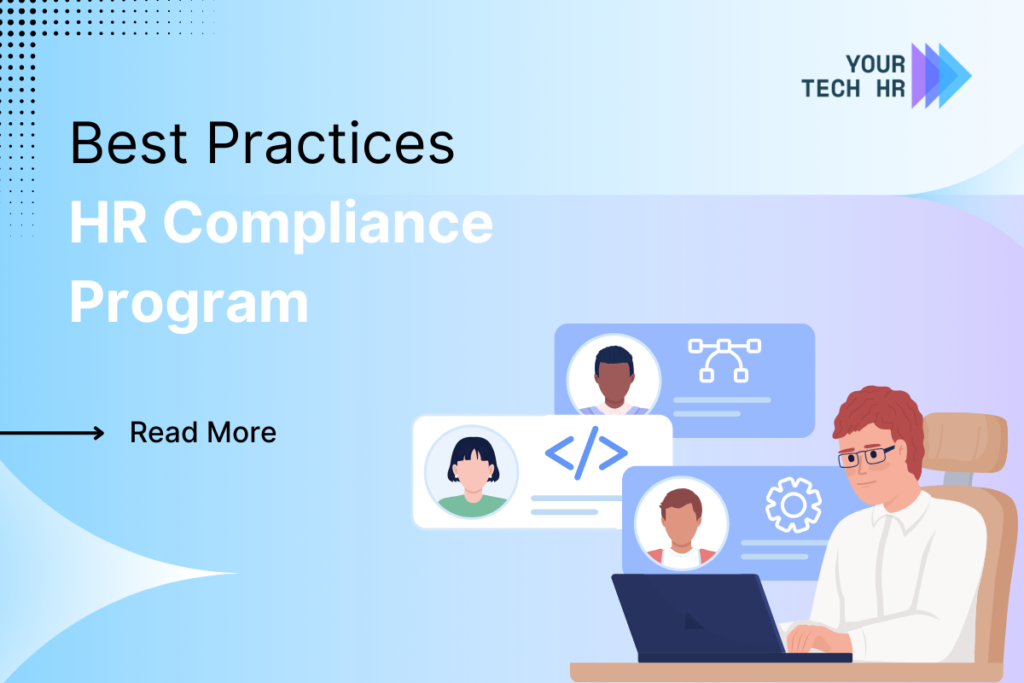Hey there! Today, we’re going to talk about something really important for businesses: HR compliance programs. Don’t worry if that sounds complicated – we’ll break it down so it’s easy to understand!
What is an HR Compliance Program?
An HR compliance program is like a set of rules and habits that a company follows to make sure they’re treating their workers fairly and following all the laws about work. It’s kind of like how we have rules at school to make sure everyone is safe and treated nicely.
Why is it Important?
Having a good HR compliance program is super important because:
- It keeps the company out of trouble with the law
- It makes sure all workers are treated fairly
- It helps the company run smoothly
- It makes the company look good to others
Now, let’s talk about some of the best ways to create a strong HR compliance program!
1. Know the Rules (Employee Compliance)
The first step is to learn all about the rules that apply to your company. This includes things like:
- Labor Laws: These are big rules that say how companies should treat their workers.
- Employment Laws: These are more specific rules about hiring, firing, and treating employees.
- Wage and Hour Laws: These rules say how much companies should pay their workers and how long they can work.
It’s a good idea to have a grown-up who knows a lot about these laws (like a lawyer) help you understand them.
2. Write Down Your Rules
Once you know the laws, write down your own company rules that follow these laws. This is often called a “policy manual” or “employee handbook”. Make sure it’s written in a way that’s easy for everyone to understand.
Your handbook should cover things like:
- How people get hired and fired
- What kind of behavior is expected at work
- How people can report problems
- What benefits workers get
Remember to update this handbook regularly as laws change or your company grows.
3. Train Everyone
It’s not enough to just have rules – you need to teach everyone about them! Have regular training sessions to explain the rules and why they’re important. This helps with employee compliance, which means everyone following the rules.
Make your training fun and interesting. You could use:
- Videos
- Games
- Group discussions
- Real-life examples
Don’t forget to train new workers when they start, and give everyone a refresher course at least once a year.
4. Keep Good Records
Keep careful records of everything related to your workers, like:
- When they work
- How much they get paid
- Any complaints or problems
- Training they’ve done
Good record-keeping helps you prove that you’re following all the rules if anyone ever asks. It’s like keeping a diary for your company!
Use a good computer system to help you keep track of everything. Make sure this system is secure so no one can see private information who shouldn’t.
5. Stay Up to Date
Laws can change, so it’s important to keep learning about any new rules. You might want to:
- Subscribe to newsletters about work laws
- Attend workshops or classes
- Join groups for HR professionals
- Follow government websites that talk about work laws
Make it someone’s job to keep track of new laws and tell everyone else about them.
6. Be Fair to Everyone (EEOC Compliance)
There’s a special group called the Equal Employment Opportunity Commission (EEOC) that makes sure companies treat all workers fairly, no matter what they look like, where they’re from, or how old they are. Make sure your company follows these rules carefully.
Some ways to be fair include:
- Hiring people based on their skills, not how they look
- Giving everyone the same chances to get better jobs in the company
- Making sure your workplace is friendly to people with disabilities
- Not allowing anyone to be mean to others because of who they are
7. Pay People Correctly (Wage and Hour Compliance)
One of the most important things is to pay your workers correctly. This means:
- Paying at least the minimum wage
- Paying extra for overtime work
- Giving breaks as required by law
- Classifying workers correctly (like knowing the difference between an employee and a contractor)
This is especially important for new companies (Wage and Hour Compliance for Startups) who might not know all the rules yet.
Keep very careful records of all the hours people work and how much they get paid. This will help you if anyone ever questions whether you’re paying people right.
8. Protect Private Information (Data Privacy)
Companies often have a lot of private information about their workers, like their addresses, social security numbers, and bank details. It’s very important to keep this information safe. This is called data privacy compliance for HR professionals.
Some ways to protect data include:
- Using strong passwords
- Limiting who can see private information
- Using secure computer systems
- Training workers on how to keep information safe
- Having a plan for what to do if private information accidentally gets shared
Remember, keeping people’s information safe is not just a good idea – it’s the law in many places!
9. Have a Way to Handle Problems
Sometimes, workers might have problems or complaints. It’s important to have a clear way for them to report these issues and for the company to solve them fairly.
Create a step-by-step process for handling complaints. This might include:
- A way for workers to report problems without fear of getting in trouble
- A promise to look into all complaints quickly and fairly
- A system for keeping track of complaints and how they were solved
- A way to protect people who report problems from being treated badly
Make sure everyone knows about this process and feels comfortable using it.
10. Plan for Different Types of Workers
These days, many people work from home or other places outside the office. It’s important to think about HR compliance for remote workers too. This might include:
- Making sure they have safe work spaces
- Tracking their work hours accurately
- Keeping in touch regularly
- Making sure they can access training and company information
- Thinking about how to keep company information safe when people work from home
Don’t forget about other types of workers too, like part-time workers or contractors. They might have different rules that apply to them.
11. Get Help When You Need It
Sometimes, HR compliance can be tricky. It’s okay to ask for help! Many companies get legal counsel for HR compliance issues. This means they have a lawyer who specializes in work laws to help them make sure they’re doing everything right.
You might want to get help when:
- You’re not sure how a new law applies to your company
- You have a complicated problem with a worker
- You’re making big changes to how your company works
Remember, it’s better to ask for help early than to make a mistake and get in trouble later!
12. Check Yourself Regularly
Even if you think you’re doing everything right, it’s a good idea to check regularly. You can:
- Do your own review of your HR practices
- Have an outside expert check your compliance program
- Fix any problems you find quickly
Make a schedule for these checks, like doing a big review once a year and smaller checks every few months.
13. Use Technology to Help
There are many computer programs that can help with HR compliance. These can help you:
- Keep track of work hours
- Manage employee information
- Send reminders about important compliance tasks
- Create reports to see how well you’re following the rules
Look for programs that are easy to use and can grow with your company. Make sure they’re secure and follow data privacy rules too.
14. Create a Culture of Compliance
Finally, try to make following the rules a normal part of how your company works. Encourage everyone to speak up if they see something wrong, and praise people who follow the rules well.
Some ways to do this include:
- Talking about compliance in company meetings
- Including compliance in how you judge how well people are doing their jobs
- Having company leaders set a good example by following the rules
- Celebrating when your company does well in compliance checks
Remember, building a strong HR compliance program takes time and effort, but it’s worth it! It helps create a fair, safe, and happy workplace for everyone. By following these best practices, you can make sure your company is doing the right thing for all its workers.


